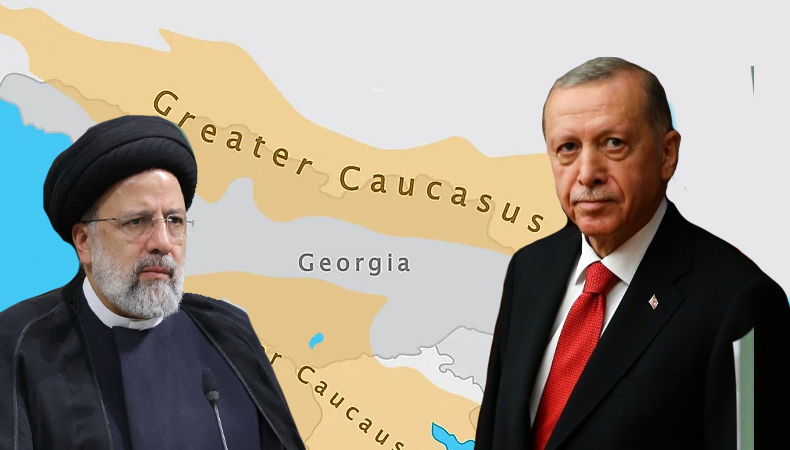Navigating the Turkish-Iranian Struggle for Influence in the Caucasus

Turkey and Iran are currently engaged in a power struggle over influence in the South Caucasus, a region distinguished by its complicated network of ethnicities, boundaries, and historical complexity. This geopolitical rivalry not only jeopardizes regional stability but also makes it difficult for all parties involved to work together.
The seriousness of this issue is highlighted by the recent meeting between Turkish Foreign Minister Hakan Fidan and Iranian President Ebrahim Raisi. Iran is worried about Turkey’s expanding influence in the Caucasus, as evidenced by Raisi’s appeal for locals to oppose “foreign parties” there. One must take into account the larger background, including Tehran’s foreign policy and the role that Turkey is thought to play, to fully understand the dynamics at play.
The regional power structure was altered by the Nagorno-Karabakh war in 2020. The triumph of Azerbaijan over Armenia, which reduced the power of Iran, was greatly aided by Turkey’s support for the country. At the same time, Russia’s involvement in the conflict in Ukraine took its focus away from the Caucasus. This change in geopolitics benefited Turkey.
Turkey, a NATO member, is gradually exerting itself in the Caucasus, historically regarded as Russia’s backyard, despite its fragile relations with both Russia and Iran. With Turkey’s assistance, Azerbaijan, a major player in this conflict, can expand its influence into Central Asia and the Caspian Sea. Iran’s goal is to reduce Turkey’s influence and take back some control of the region.
Keep Reading
There is an ethnic component to the competition between Turkey and Iran in the Caucasus, which makes matters more challenging. Relations between Tehran and Baku have been strained as a result of Azerbaijan’s strong language towards the Azeris residing in Iran and military exercises close to the Iranian border. Tensions with Iran have also increased as a result of Azerbaijan’s growing connections to Israel. Tehran is fully aware that Azerbaijan has become stronger as a result of assistance from Turkey, Israel, and Russia as well as Russia’s inability to stop Armenia from losing.
Given its plan to shift its focus to Asia, the United States is unwilling to fill the void created by the absence of a significant Russian presence in this complex regional environment. Iran and Turkey are left in control of the Caucasus.
Iran supports the peace negotiations between Azerbaijan and Armenia as part of its diplomatic strategy to control its conflict with Turkey. This action tries to defuse tensions with Azerbaijan, stop it from moving closer to Israel, and lessen Turkey’s mediation duties. Iran, however, does not have the same influence over Azerbaijan as Turkey or Russia do.
Iran’s interests are put in jeopardy by Turkey’s attempts to connect with Central Asia via the Caspian Sea economically. This rivalry is exemplified by the Zangezur corridor, a component of a bigger undertaking that links Baku and Istanbul via Armenian territory.
It is important to consider these several factors when interpreting Iran’s persistent emphasis on “foreign presence” and its cautions against “border changes” and “blocking of existing transit routes” in the South Caucasus. The balance of power in the region and Iran’s domestic security are both factors in its foreign policy towards the region.
The use of diplomatic channels to resolve differences is essential for maintaining regional security and cooperation as the competition between Turkey and Iran plays out in the Caucasus. Power battles should take a back seat to finding common ground and resolving ethnic tensions. In the end, the Caucasus should serve as a bridge for collaboration among its different nations rather than a theater of conflict.







